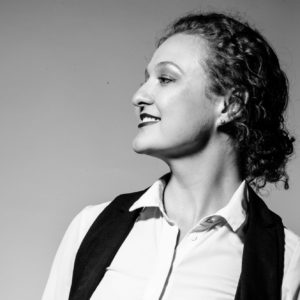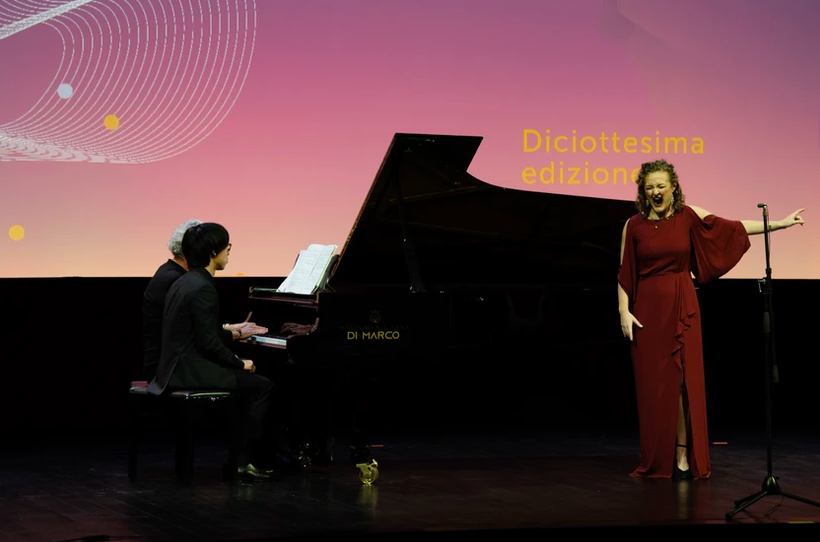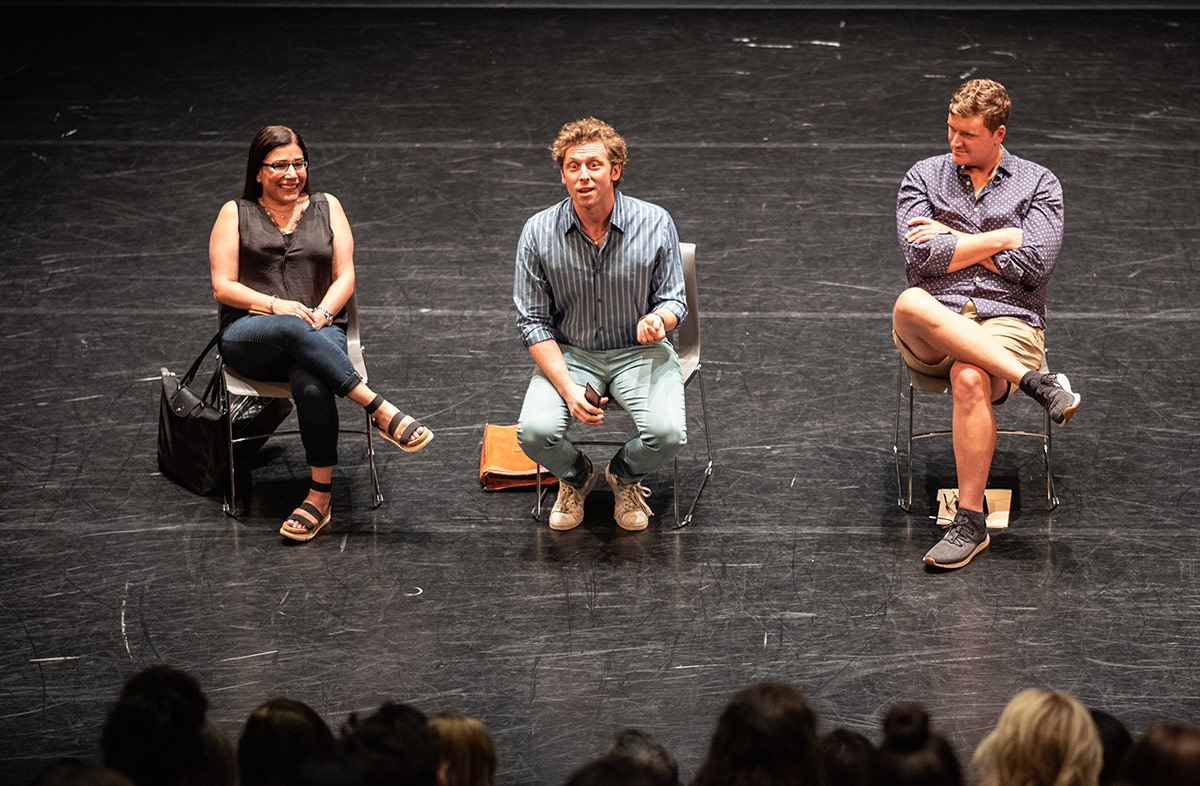Are you tired of nerves getting the better of you in your auditions? Do you hate walking offstage during a show and thinking “that was good, but it was better in my lesson yesterday”? Are you looking for that last piece of the puzzle that will keep your nerves from sabotaging your voice?
You’re in the right place.
The good news is, that it’s entirely possible to develop a secure vocal technique that is highly resistant to nerves, illness, rooms with a lousy acoustic, and other stressors in your life.
The good news is, that it’s entirely possible to develop a secure vocal technique that is highly resistant to nerves, illness, rooms with a lousy acoustic, and other stressors in your life.
The bad news is, it’s not a one-step quick fix.
But the other good news is, there is still a degree of improvement you can develop very quickly. Whether you’re a senior in the middle of audition season, or you’re a sophomore or junior preparing to take the plunge, here’s my advice to help you get on top of the nerves and your vocal technique when you’re under pressure.
First, if you’re a senior reading this in the middle of audition season, let’s take a second to take stock: your prescreens are done. Your songs have been selected. You’re up to your eyeballs in travel plans and hotel reservations and spreadsheets full of audition information. It’s a stressful time.
So: now is not the time to be adding another thing to your to-do list, or cramming in vocal technique sessions the night before your next audition. You have done the work that you are going to be able to do; your job right now is to walk into the audition room and represent yourself as you are, imperfections and all, and allow the college panels to assess whether you are the right fit for one another for a four-year educational relationship.
Now is not the time to be adding another thing to your to-do list, or cramming in vocal technique sessions the night before your next audition.
And the unpleasant little secret? Even if you booked a vocal technique session the night before every audition from here until Decision Day, you wouldn’t see it reflected in your audition singing.
Why?
Because you have ironed those songs into your body. You have spent months and months and months rehearsing them – you have wired a certain way of executing that music into your brain and voice, and you are not going to be able to shift that overnight, or even in a week or a month when you are bringing it into the high-stakes arena of an audition room. Your body will hold on tightly to what it knows in that environment; trying to introduce a new idea on short notice will only cause it to double-down and resist you even more.
You have wired a certain way of executing that music into your brain and voice, and you are not going to be able to shift that overnight.
However, the other side of this is the reality that your auditioning voice is more reliable than you think, if you will allow it to be.
This is the part that you can change your relationship to, relatively quickly.
Remember: you can’t have your best day every day.
Remember: you can’t have your best day every day.
The great operatic soprano, Beverly Sills, who was renowned for having a rock-solid high register that never seemed to fatigue and could cut through even large orchestras without a microphone like a knife, was one asked about how she felt about her performances. She famously answered that she had exactly four perfect singing days in her entire career – and “it’s a pity not one of them was during a performance.” Your job – both as an auditioning student and eventually as a working professional – is to make sure that you on a “meh” day still give the audience their money’s worth. Your job is to be able to meet the requirements of your job even on the days you don’t feel your best – which thankfully means that there is no obligation to have your very best vocal day on an audition day.
Your job is to be able to meet the requirements of your job even on the days you don’t feel your best – which thankfully means that there is no obligation to have your very best vocal day on an audition day.
If you’ve been diligent about your vocal technique work in the course of your prescreens and audition preparation – if you have been showing up for regular sessions, practicing with focus and intention, and deeply integrating what your coach has offered you, that means that your voice is still going to respond in your auditions very similarly to the way it responds in your voice lessons. Maybe you won’t have that extra 5 or 10% of real “wow” factor that you found in your most recent lesson – but the technical base that you spent careful months building with your coach won’t abandon you.
The technical base that you spent careful months building with your coach won’t abandon you.
If you can resist the urge to panic when things feel a little different in the audition room, when the nerves start to make you wonder if you’ve forgotten how to sing entirely, and simply open your mouth, drop the needle on the record, and go – you will find your voice responds 90% of the way you’re used to, 90% of the time, leaving you the mental energy to focus on your theatrical choices, a sense of experimentation and play, and yes – maybe a little more technical focus through the tricky parts.
This is why I recommend doing a stress-test to most of my students – and it’s one of the many incredible benefits of MTCA’s mock auditions. You get the chance to experience how your voice responds to the nerves – and to practice the mental response to it as well. When we’re nervous, we feel our breath get shaky, our mouth get dry, our vocal cords don’t want to come together, and we compensate by trying to be louder, safer, more controlled – to the point where we actually throw our voice off-balance from the force of our effort to keep it centered! Remember how I said your voice is more reliable than you think – if you allow it to be? You sometimes have to loosen your death grip and trust your muscle memory to guide you.
You sometimes have to loosen your death grip and trust your muscle memory to guide you.
The stress test of an MTCA Mock – or a mock session you set up for yourself – can help you observe these over-controlling sensations and tendencies and practice actively disengaging from them. My favorite trick (even in my own auditions!) is to remind myself to simply speak the next word – and it’s purely by accident that the pitch written on the sheet music comes out with it.
My favorite trick is to remind myself to simply speak the next word – and it’s purely by accident that the pitch written on the sheet music comes out with it.
This usually puts my voice into a “Goldilocks” zone within a few notes – not too pressed, not too airy, but strong, clear, and responsive to my artistic choices: just right. Speaking is one of the things we do most instinctively, and it can be a very helpful cue to my body to get back to the gestures it has made a habit when my nerves and brain are starting to get in the way.
Speaking is one of the things we do most instinctively, and it can be a very helpful cue to my body to get back to the gestures it has made a habit when my nerves and brain are starting to get in the way.
As a general rule, assume that on a normal day in an audition, your voice will reflect where your vocal technique was two weeks ago. It won’t bail on you and set you back to singing the way you were as a freshman – but if you had a really excellent lesson with your vocal tech coach a week ago, those developments most likely would not have had time to become integrated enough into your vocal habits to be reflected in your audition. Sure, you might see hints of it, and you may be able to remember useful strategies from your coach (“speak the low notes” or “sing an ‘eh’ instead of an ‘ah’ at the top of the staff to remain in a stable mix”) that work in the audition, but their habitual, reliable, and reflexive use will not be present in your voice. But all the work you did in all those lessons leading up to it will be, even if you aren’t consciously aware of them.
As a general rule, assume that on a normal day in an audition, your voice will reflect where your vocal technique was two weeks ago.
If you are a senior, the biggest trick to unlocking your vocal technique in your auditions is trust. Trust that it is already there, that you have built it diligently over the past year, and that you do not need to be different in your audition today than you were yesterday. Your vocal technique sessions at this point in your progression should be focused on maintenance and polishing off little rough edges in your pieces – not because there’s not always room for growth, but because you don’t need the onus of major breakthroughs on an already-full plate. If you’re really nervous, schedule more frequent 30-minute lessons instead of sporadic hour-long sessions with your vocal tech coach: they will help keep you healthy and vocally centered through this period.
If you’re really nervous, schedule more frequent 30-minute lessons instead of sporadic hour-long sessions with your vocal tech coach: they will help keep you healthy and vocally centered through this period.
Your responsibility in the audition room is to show up, smile, and trust that the opening notes you’ve sung exactly the same way 1000 times will still be there waiting for you when you open your mouth to sing them for the 1001st time.
Now, if you are a junior, or a sophomore, or a freshman, the conversation is a little different, because you have one thing the seniors right now don’t have: time – and time is incredibly valuable when building vocal technique.
Charlie has said it a hundred times: singers are like athletes, and I couldn’t agree more. Your voice takes time and repetition to develop – you can’t go from zero to being an Olympic runner overnight, and similarly, vocal technique takes time, focus, and repetition to be something that will support you through the sprint of a single audition and the marathon of audition season! But if you’re at least 6 months out from your prescreens – or even better, more than a year – you have a wealth of time to lay a strong foundation which you will reap the benefits of when senior auditions roll around.
If you’re at least 6 months out from your prescreens – or even better, more than a year – you have a wealth of time to lay a strong foundation which you will reap the benefits of when senior auditions roll around.
My advice to you now is to be willing to be bored for a little bit: work with your vocal technique coach frequently, and exclusively on vocal technique, even if your sessions are only 30 minutes long. Be willing to put off diving into the repertoire right away. Songs bring baggage with them: pressure to sound like the Broadway cast or your favorite singer, the expectations of a particular style, and pitfalls of the way a particular melody or orchestration impacts your voice. While tech-only sessions for a few months may feel like having to eat your vegetables, they pay dividends in the long term – both as you’re singing on your own, and when you begin to bring repertoire from your song coachings into your vocal technique sessions. You’ll find your voice is already applying the technical work to your songs before your Vocal Tech coach gives you a single adjustment in a lesson.
While tech-only sessions for a few months may feel like having to eat your vegetables, they pay dividends in the long term.
If that sounds desperately boring to you, it might indeed be, but it is also a necessary part of making the transition from singing for fun to singing as a profession – sometimes the work required to develop your craft to the point where you are able to give a performance that gives the audience their money’s worth even on a day where you don’t feel your best is tedious. Matchilde Marchesi, who trained more opera stars than any teacher before or since, and whose students would go on to teach the first generation of musical theater singers, required her students to sing nothing but vowels and very simple scales for six months, until they had perfect command over the fundamental tone and attack of their voice – only then did she begin to introduce longer exercises and eventually, short musical phrases.
Now, neither I nor any of the other Vocal Tech coaches here at MTCA are going to force you to sing nothing but “A, E, I, O, U” for six months, but your vocal security in audition season will only be helped by putting in the work – the boring, tedious, repetitive, unglamorous work – as far in advance as possible, because that is the foundation on which your songs will rest. The boring work becomes habit, which becomes reflex – a gesture of theatrical singing that is so responsive to your artistic impulses and so deeply ingrained into your body that the worst nerves in the world can’t knock it off-center, so that when you show up to those all-important audition rooms, listen to the first bars on the piano, and take that first breath to sing, no matter how nervous or excited or tired you are, you know exactly how your unique voice is going to come out.
About the Author

Mary is a dynamic performer and voice teacher originally from the rural American southwest, praised for their “striking” performances (OperaWire) and “elegant interpretation” (BroadwayWorld) in opera, musicals, concerts, and plays across the US and Europe, including at Carnegie Hall in New York, the Teatro Argentina and Auditorium Conciliazione in Rome, and the Alte Münze in Berlin, and performances with City Lyric Opera, Opera Fayetteville, Rome Chamber Music Festival, Moab Music Festival, Ars Musica, and the Brooklyn Telemann Chamber Society. Roles include Hänsel in Hänsel und Gretel, The Queen of Hearts in the US premiere of The Garden of Alice, Prince Orlofsky in Die Fledermaus, and Emperor Nero in L’incoronazione di Poppea. Not limited to classical music, they have been featured in Broadway Premieres and Wall-to-Wall Stephen Schwartz with Symphony Space, the Lifetime Achievement Gala for Hal Prince, and performed as everything from a Hot Box Dancer in Guys and Dolls to Puck in A Midsummer Night’s Dream and Macduff in Macbeth. They have maintained a private voice studio since 2014. Their students span genres from pop to classical to rock, from hobbyists to working professionals, and have released albums, headlined regional musicals, and begun teaching studios of their own. www.mary-rice.com




